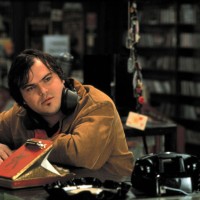For a number of years I co-edited the Journal of Cultural Economics, and the core duty of the editor of a research journal is to guide through revision and publication papers that have findings new and interesting enough to advance our knowledge, and to turn away those papers that are either mistaken in their applications of theory and empirical work, or simply not all that relevant. The journal had to be selective - fewer than 20 percent of submissions were eventually published - and so a lot had to be turned away. What I found was that few of … [Read more...]
At the record store
I used to love going to record stores when I was a teenager. I couldn't buy much - a back-of-the-envelope calculation tells me it would have taken me 3 or 4 hours of work at my Saturday job at the Oasis Car Wash (it's still there!) to afford one LP - but it was enjoyable to browse, and make the occasional carefully selected purchase. When my friend Mike and I would make the drive from Vancouver to Seattle we would always make a point of going to the neighborhood around UW where there was a handful of used-record shops. So I am not completely … [Read more...]
What do we want from a Culture Secretary?
Sajid Javid has been appointed s the UK Secretary of State for Culture, Media and Sport. His backstory is here, and misgivings about the appointment of someone from the world of finance with no obvious affinities for the high arts are in the Guardian here and here. Blog neighbour Paul Levy writes: The only thing we really know about his interest in the arts is that he has defended ticket touts. We’ll see. I, of course, want a Culture Minister who is an opera queen, a collector of contemporary art, a theatre buff, a reader of fiction and … [Read more...]
Nonprofit costs are driven by revenues
This post takes us through health care, college sports, and opera... One of the first things arts administration students are taught about nonprofit organizations is that by law, and by definition, nonprofits are not to distribute any net earnings to managers or shareholders, but rather any revenues over costs must be applied to the mission-related activities of the organization, either through program spending or through saving it. Nonprofits that spend all of their revenues, in turn, "don't make any money." But it's not quite so simple. … [Read more...]
The Logic of Collective Action in Music Recording
The New York Times reports on efforts in the music industry to coordinate lobbying: When it comes to the music industry’s lobbying efforts in Washington, it is time for some harmony. That message has gained momentum among music executives, who worry that squabbling among the various players — record labels, music publishers, artists, songwriters — will undermine broader initiatives to push for new legislation and regulatory reform. On Wednesday, the head of the organization behind the Grammy Awards will host a dinner in Washington attended … [Read more...]
Deaccessioning as a singular event (updated again)
The Delaware Art Museum is planning on selling some works to pay off debt. The New York Times reports here, noting that "selling works to pay for operations or capital projects is widely considered an ethical violation, a betrayal of a museum’s role of holding art in public trust" (and see Art Law Blog here). The museum released a Q&A, and it is the very last question that interests me: 14. What will happen the next time the Museum needs money? I’m worried that the Board will look at the collection as a source of revenue. It is our … [Read more...]
What does it mean to be a ‘strategic’ arts manager? (Updated)
The question came to mind when browsing The Economist's style guide, which contains the entry: "Strategic" is usually meaningless except to tell you that the writer is trying to invest something with a seriousness it does not deserve. But I think that is too harsh, and there are times when we could say a manager is thinking strategically and when she is not. There are two components to thinking strategically. First, the manager thinks carefully about the goals she wishes her organization to achieve, whether profit or some other … [Read more...]
Don’t just stand there, build something
The San Diego Opera is closing down, unable to see a way to reconcile its finances. Mark Swed, at the LA Times, is upset by the decision. What to do? No town is in more need of a performing arts center. New halls are sexy. I must have been away the day in cost-benefit analysis class when the professor covered the sexiness of expensive building projects when one of your major performing arts companies has just closed due to insufficient funds... … [Read more...]
Taxing Music Downloads
Europeans have been able to avoid high home-country tax rates on downloads of songs and books by purchasing through Luxembourg. The UK wants to put a stop to that. The Guardian reports: George Osborne's latest budget could spell an end to 99p song downloads by closing a tax loophole that meant consumers were paying VAT at very low foreign rates on online purchases of books, music and apps. The chancellor will bring in new laws making sure that internet downloads are taxed in the country where they are purchased, meaning web firms such as … [Read more...]
Creativity, Craft, and the Quants
In the New York Times, Timothy Egan worries we stifle creativity in the search for expert quantitative analysis. He writes, in "Creativity vs. Quants": Here’s how John Lennon wrote “Nowhere Man,” as he recalled it in an interview that ran just before he was murdered in 1980: After working five hours trying to craft a song, he had nothing to show for it. “Then, ‘Nowhere Man’ came, words and music, the whole damn thing as I lay down.” ... We’ve bottled lust. We’ve refined political analysis so that nearly every election can be accurately … [Read more...]










